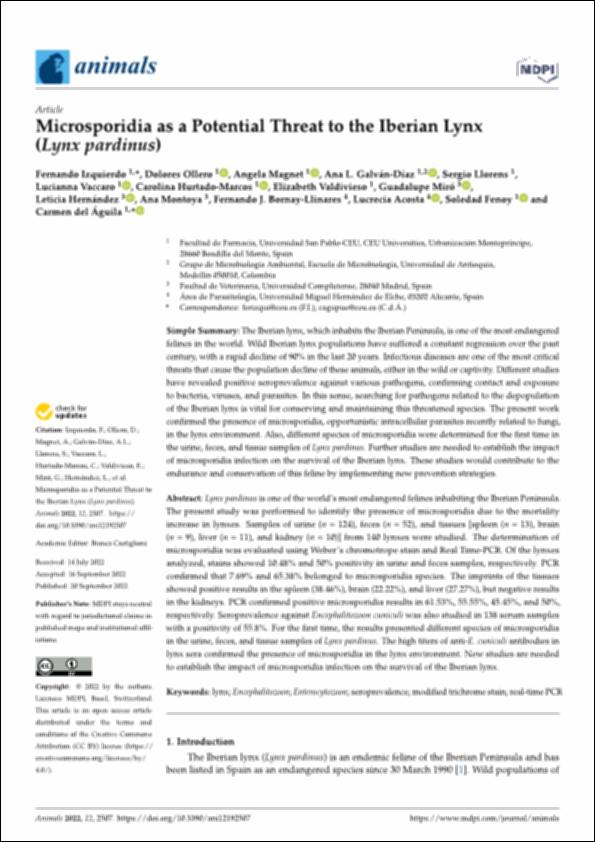Por favor, use este identificador para citar o enlazar este ítem:
http://hdl.handle.net/10637/15091Microsporidia as a Potential Threat to the Iberian Lynx (Lynx pardinus)
| Título : | Microsporidia as a Potential Threat to the Iberian Lynx (Lynx pardinus) |
| Autor : | Izquierdo Arias, Fernando Ollero Baceiredo, Dolores Magnet, Angela Galvan-Diaz, Ana Luz Llorens Berzosa, Sergio Vaccaro Muñoz, Lucianna Rosalía Hurtado Marcos, Carolina Valdivieso Blanco, Elizabeth Miró, Guadalupe Hernández Martínez, Leticia Montoya Matute, Ana Bornay Linares, Fernando Jorge Acosta Soto, Lucrecia Fenoy Rodríguez, Soledad Águila de la Puente, Carmen del |
| Materias: | Lynx; Encephalitozoon; Enterocytozoon; Seroprevalence; Modified trichrome stain; Real-time PCR |
| Editorial : | MDPI |
| Citación : | Izquierdo F, Ollero D, Magnet A, Galván-Díaz AL, Llorens S, Vaccaro L, Hurtado-Marcos C, Valdivieso E, Miró G, Hernández L, Montoya A, Bornay-Llinares FJ, Acosta L, Fenoy S, Del Águila C. Microsporidia as a Potential Threat to the Iberian Lynx (Lynx pardinus). Animals (Basel). 2022 Sep 20;12(19):2507. doi: 10.3390/ani12192507. PMID: 36230249; PMCID: PMC9559491 |
| Resumen : | Lynx pardinus is one of the world’s most endangered felines inhabiting the Iberian Peninsula. The present study was performed to identify the presence of microsporidia due to the mortality increase in lynxes. Samples of urine (n = 124), feces (n = 52), and tissues [spleen (n = 13), brain (n = 9), liver (n = 11), and kidney (n = 10)] from 140 lynxes were studied. The determination of microsporidia was evaluated using Weber’s chromotrope stain and Real Time-PCR. Of the lynxes analyzed, stains showed 10.48% and 50% positivity in urine and feces samples, respectively. PCR confirmed that 7.69% and 65.38% belonged to microsporidia species. The imprints of the tissues showed positive results in the spleen (38.46%), brain (22.22%), and liver (27.27%), but negative results in the kidneys. PCR confirmed positive microsporidia results in 61.53%, 55.55%, 45.45%, and 50%, respectively. Seroprevalence against Encephalitozoon cuniculi was also studied in 138 serum samples with a positivity of 55.8%. For the first time, the results presented different species of microsporidia in the urine, feces, and tissue samples of Lynx pardinus. The high titers of anti-E. cuniculi antibodies in lynx sera confirmed the presence of microsporidia in the lynx environment. New studies are needed to establish the impact of microsporidia infection on the survival of the Iberian lynx. |
| URI : | http://hdl.handle.net/10637/15091 |
| Derechos: | http://creativecommons.org/licenses/by-nc-nd/4.0/deed.es OpenAccess |
| ISSN : | 2076-2615 |
| Fecha de publicación : | 20-sep-2022 |
| Centro : | Universidad San Pablo-CEU |
| Aparece en las colecciones: | Facultad de Farmacia |
Los ítems de DSpace están protegidos por copyright, con todos los derechos reservados, a menos que se indique lo contrario.


